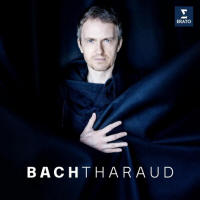Texte paru dans: / Appeared in:
|
|
|
|
|
|
In September 2005 Nalen Anthoni signed off his review of Alexandre Tharaud’s disc of Bach concerto transcriptions with the words, ‘Odd, isn’t it?’ Nalen was referring to the juxtaposition of Bach keyboard originals and the transcriptions of Bach’s own transcriptions of concertos by others, and also to the alternation of strict terraced dynamics and romantic inflections in the playing.
This new disc presents a not dissimilar mixture, with repertoire from clavier originals to transcriptions from pieces for lute, Passion extracts and chorale preludes. Far from being swayed by reservations concerning his full-blooded pianist approach, Tharaud has evidently doubled down on them. This disturbs me not at all in principle, but quite a lot in practice. ‘Herr, unser Herrscher’, the opening chorus from the St John Passion, for example, is massively overlaid with pedal, perhaps in order to simulate large choraland-orchestral forces, perhaps to suggest a cathedral acoustic. That I can tolerate. But Tharaud’s insistent delivery creates a haranguing, almost bludgeoning quality that I cannot. The same thing bothers me in the keyboard Fantasia, where the initially engaging energy rapidly outstays its welcome and the rubato becomes predictable. Even the modest Lute Suite acquires a curiously hectoring tone.
In some of the faster movements, Tharaud can be sprightly and stylish, and in the more intimate pieces there is no doubting his devotion to the cause. The two sicilianos are lovingly shaped (hear Kempff in his transcription of the Flute Sonata movement for a more ascetic approach). Tharaud’s Bach/Marcello Adagio has its heart in the right place, but is unlikely to dislodge the hypnotic Gould from anyone’s affections. In the Méditation, he applies a layer of his own cheese upon Gounod’s, but without a trace of wink-wink naughtiness that would suggest he is only kidding.
It would be nice to know what guided him in some of his choices: such as omitting two movements in the Lute Suite, and when to deviate from the text with octave transpositions, rhythmic alterations and so on. Not addressing any of these issues, Erato’s booklet note is verbose, airy-fairy and uninformative.
The recorded sound is pleasing enough, though with an unyielding quality in fortissimo. All in all, then, what should have been an indulgent experience became, for me at least, something of a penance. |
|




